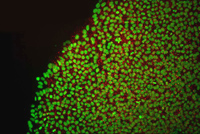Stem cells to be received from abortive material
The issue of stem cells received from abortive material arouses a variety of moral and religious disputes
Russian scientists believe that the most perspective use of stem cells in modern medicine will be directly connected with abortive material. Professor Gennady Sukhikh from the Center for Obstetrics and Gynecology of the Russian Academy of Sciences, said that fetal or embryonic stem cells (depending on the term when pregnancy was terminated) are called body cells (tissue-specific cells). Such cells undergo the primary differentiation under the conditions of a growing human organism. 
This detail allows scientists to control and predict the further differentiation process of stem cells. Such stem cells get the better of early embryonic cells received from a seven-day-old fetus (or blastocyst cells). According to the Russian professor, foreign scientists conduct an extensive research work to study early embryonic stem cells. The research, which requires billion-dollar investments, has not brought any results: specialists of transnational scientific groups and largest pharmaceutical companies have not determined the mechanism of directional differentiation of early embryonic stem cells.
In addition, such embryonic stem cells may not undergo the differentiation process. Low-grade differentiated cells trigger malignant growths, teratoma. The use of early embryonic stem cells in medicine thus remains the issue of distant future. The results of recent research works show that those stem cells which have not been subjected to a certain “training process” in a living organism do not have any perspective of their clinical usage in the future.
Two other traditional sources of stem cells - umbilical blood and marrow – can be used in oncology and hematology. Both umbilical blood and marrow contain high-grade differentiated stem cells – predecessors of blood cells. Such stem cells are considered “mature” in terms of immunology: recipients' protective systems perceive these cells as alien bodies. Nevertheless, European scientists pay too much attention to this direction of research because hemopoietic stem cells are ethically pure.
Gennady Sukhikh stressed out that the work of Russian scientists proved the efficiency of body stem cells in clinical practice to recreate injured tissues. It goes without saying that the issue of stem cells received from abortive material arouses a variety of moral and religious disputes. Professor Sukhikh, however, is certain that the majority of such problems are based on far-fetched arguments.
You can discuss this article on Pravda.Ru FORUM
Subscribe to Pravda.Ru Telegram channel, Facebook, RSS!




